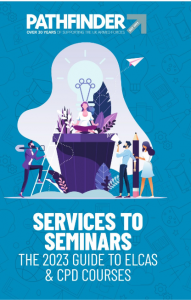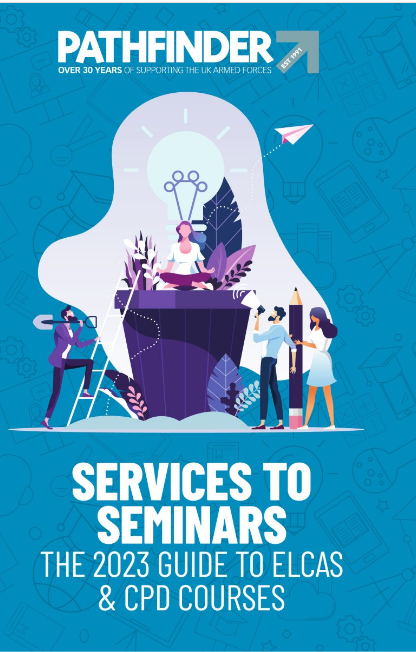This month’s career advice from Giles O’ Halloran inside Pathfinder looks ahead to our ELCAS focus later in the issue and offers six points of advice to help you on your learning journey…whether you are in the forces or have recently left…

Many of you will study for qualifications in the military, as either part of a potential promotion or for your wider professional development. Many of you will also consider learning new skills, trades, or qualifications on leaving the service in order to transition into second careers as civilians. Learning is now recognised as a lifelong skill but many of us have not changed the way we approach learning since we left school. Learning also doesn’t have to always involve a certificate or qualification, it is about keeping your skills, knowledge, and expertise up to date as a professional and modern ways of learning offer lots of ways to help you achieve this.
However, learning is easier said than actually done. It is not something we can do at any time and many of us have to be in the right frame of mind to do so. There are so many distractions that can impact our ability to learn or to absorb information. Perhaps by achieving the right balance of the six simple things below, you can make it work for you and your own way of learning.
In this piece, I therefore want to offer you a simple framework to consider when managing your learning. Through doing so, you will hopefully improve your ability to learn. The six factors are 1.) Want 2.) Ways 3.) Means 4.) Time 5.) Space and 6.) Recall and by combining them, I hope they will help you.
Want:
The first point is the want and desire to learn. You need to want to learn and have the commitment to do so. If you are not in the right frame of mind or if the subject matter does not engage or interest you, you will never be able to maximise your learning opportunity. Want is about your motivation – the why – and this will be very different things to different people. It maybe that the subject matter genuinely interests you, it could be for promotion, or it could be about achieving recognition as a professional, specialist or expert. Whatever the case, you need to have the want or desire to learn otherwise you will not absorb the learning.
Ways:
Having the desire and motivation to learn is one thing, but have you taken time to consider how you learn? Lots of people default to the classroom model because it is something we have been conditioned to do. However, it is not always the best way to learn, and we need to understand our own learning preferences. Some of us might like the classroom, but this might be because we can discuss ideas and socialise the learning. Some of us might prefer to read and reflect, others might like to listen to and ponder a podcast, or download an audiobook, whereas others are more visual and enjoy learning from imagery, diagrams, or videos. You need to take time to consider which are the best ways you learn so that the content you then use is tailored to your personal preferences.
Means:
The next thing to consider is the media or technology that you use to help you learn. Some might like picking up a book and digesting the content, but many of us now use laptops, tablets, or even mobile phones to learn. You need to pick the right methods that work for you and that compliment your learning preferences above. Be mindful of media and methods that you use to learn and make sure they are in tune with the way you learn. There is often more than one source of learning content, so take the time to find what best works for you. You might not enjoy reading, but you might find the content summarised in an image or available as an audio download. Finding the right means helps improve your learning capability and outcomes.
Time:
There has to be the right time to learn. You need to be in the right frame of mind and have the time to do so. Despite this being difficult, there are ways round this. For example, we can book time in our diaries for learning or take time away to do so. It is a discipline and very easy to avoid. However, we have to remember that we cannot book every Wednesday afternoon for learning as we may not be in the best place to learn at the same time every week because to put it simply, we are not machines.
We need to consider time based on whether we need to deep learn, or light learn. Taking time to reflect and dig into learning needs a greater investment of time. However, light learning or “bitesize” learning can be done in periods of less than one hour. These might be podcasts, videos, or short learning exercises. They need less time for the learning, but you can reflect and think about the learning at a later time and date. Time is therefore a massive factor; you need to have the right time and amount of time dependent on the learning need.
Space:
Where you do your learning also makes a massive difference to the outcome. If you have lots of disturbances or the environment is not conducive to your learning preference, again this will impact your learning capability. You need to find the right space connected to the various elements above. You might need to find a quiet, clear space to do your learning. You may need to block out the world with earphones and sit in the park, or you might like to sit with colleagues and learn together discussing ideas and experiences. Each of these is a very different space, and it is about finding the right space that works for the learning required that will help you successfully learn.
Recall:
Finally, you can apply all the above and achieve your learning goals, but we often forget what we have learned further down the line. Neuroscience has proven that we only retain about 30% of what we learn 30 days later. We therefore need to go over our learning to ensure we keep our knowledge and expertise fresh. Making notes in a way that mean you can easily remember them, or modern ways of recollecting learning or keeping it fresh through creating podcast lists, video learning lists and even recording voice memos to help are all ways that create what I call a “long tail of learning.” This then means we can go back and remind ourselves of things we have learned in order to maintain our capability.
I hope this simple framework will help you achieve the learning you desire going forward.

Read the full ELCAS guide – Services to Seminars in the January issue of Pathfinder by clicking the link here!

